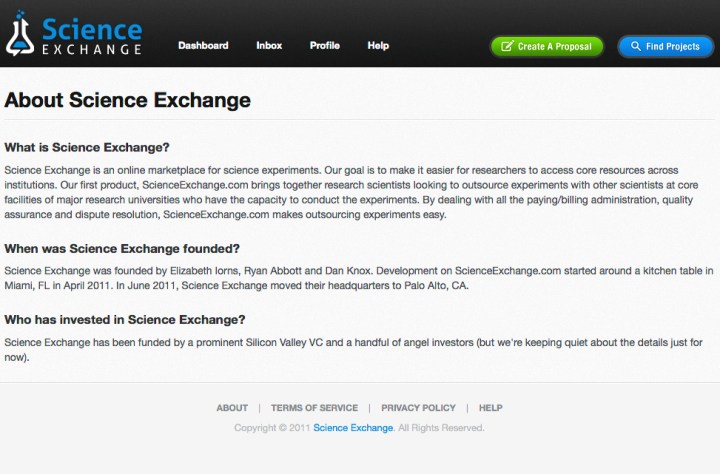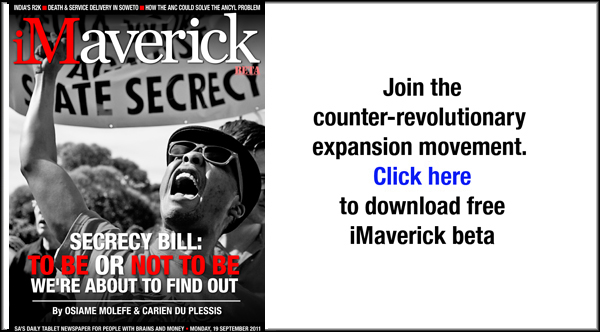Science Exchange, a crowdsourcing solution for outsourcing lab experiments

New “eBay” for scientists looks set to disrupt the research community for the better by affording greater access to elite, expensive university labs, and by connecting scientific collaborators across the globe. By MANDY DE WAAL.
Earlier this year breast cancer research scientist, Elizabeth Iorns, was sitting around a kitchen table in Miami, Florida with Dan Knox and Ryan Abbott. Knox is an entrepreneur whose technological innovation solves big market imperfections, while Abbott develops software and web applications.
The big “what if” in the centre of that table was a focus on disruptive technologies that could change the way lab experiments were outsourced. Research is expensive, not all scientists have access to the best labs and, although outsourcing in the scientific community is hardly new, the mechanisms that enable this are at best unwieldy.
After completing her B.Sc with honours in biomedical science at the university of Auckland in New Zealand, Iorns became passionate about the field of breast cancer research, but realised this research was dependent on the use of facilities in the US and UK that were highly specialised and often inaccessible.
“Core research facilities are in place at select top universities that invested in extremely expensive research equipment, but these facilities are usually only available to people who go to that university,” says Iorns speaking to iMaverick from the US.
“Yes, they should be available to anyone but it is difficult to find out about facilities, to check their availability and to pay for the use of these labs. This makes doing research at universities outside of your own really difficult.”
Iorns say the payment platforms between universities are cumbersome because institutional purchasing systems are often too onerous and inflexible. This adds to the drag of trying to access laboratories that are geared for the likes of cancer or DNA research.
In an epiphany that could have far reaching consequence, Iorns realised that a centralised “eBay of scientific research”, where researchers could easily pay for outsourced research at other universities, would be a boon. A marketplace for scientists that enables researchers to more readily connect with each other, and takes care of the headachy back end payment – what a time-saving win for researchers. And so the idea that created Science Exchange was born.
“I came up with the idea of Science Research in April 2001 and got angel and VC funding for the project,” says Iorns. As Abott and Knox worked on the back end, Iorns began evangelising and eventually embarked on a mentoring programme to get researchers to start using the marketplace.
Science Exchange is pretty simple and easy to use, and works much like an online marketplace that crowdsources bids for projects. “Researchers think of a project they would like to outsource and that requires expensive equipment or specialised expertise, like DNA sequencing,” says Iorns. “Then the scientists post details of their project at Science Exchange, and core facilities that have the available resources and the required equipment place bids for taking on this research work,” she says.
Iorns believes the most immediate contribution Science Exchange will make is increasing the amount of research done for dollar spent. “You will have better research output because people buy expensive equipment that can be used fairly rarely, or may even need to do an experiment which would not make efficient use of the resources available. By matching research to skills and facilities, scientists would be able to save money and time by getting research done by the right people at the right facilities,” says Iorns.
A major disruptor is the access Science Exchange enables scientists in more remote or undeveloped regions. “Science Exchange means that you don’t have to be at the top university in order to have access to the very best equipment, but enables researchers to share, collaborate and outsource regardless of where they are,” says Iorns.
Another breakthrough delivered by the online research marketplace is widening opportunities for partnered research. To date, scientific collaboration has largely been limited by geography, academic networks or simply by who else a scientist is aware of in their field of research. This has meant that early career collaborations too often take place between university colleagues, rather than scientists matching up partnerships based on specific insights and expertise.
Although Science Exchange was only launched in August this year, already 2,500 scientists from across the world have signed up, and Iorns says that the growth curve is steep.
“It is my hope that this ‘eBay of science’ will foster a future in which scientific research shifts to a more efficient system where everyone is a specialist, research transactions happen all the time, networking becomes very liquid and all this enables much greater collaboration,” says Iorns. DM
Read more:
- An “Ebay For Science” Promises To Transform The Business Of Research in Fast Company;
- Don’t have a lab? Now you can crowdsource your science in New Scientist;
- YC-Funded Science Exchange: A Central Marketplace For Core Research Facilities at TechCrunch.





















 Become an Insider
Become an Insider